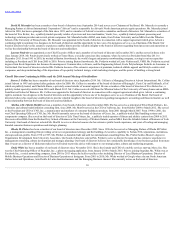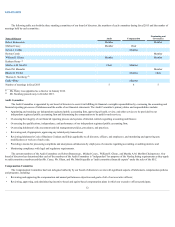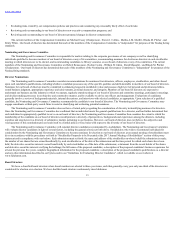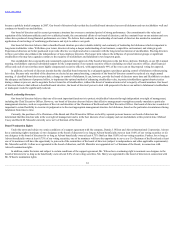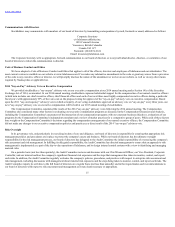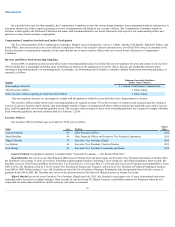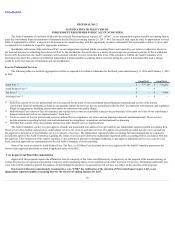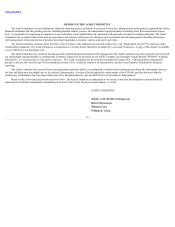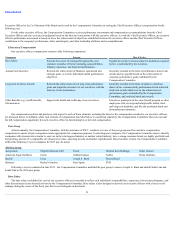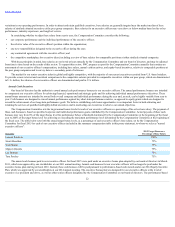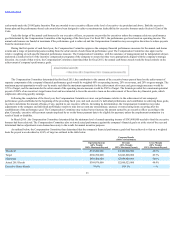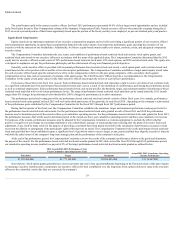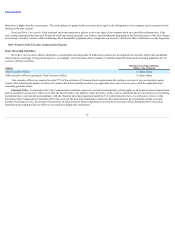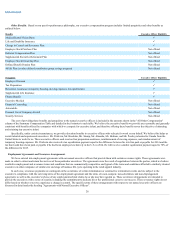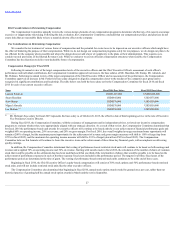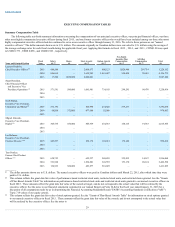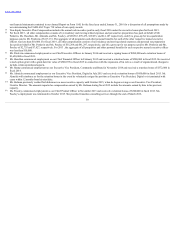Lululemon 2015 Annual Report Download - page 23
Download and view the complete annual report
Please find page 23 of the 2015 Lululemon annual report below. You can navigate through the pages in the report by either clicking on the pages listed below, or by using the keyword search tool below to find specific information within the annual report.
Table of Contents
EXECUTIVE COMPENSATION
Compensation Discussion and Analysis
Compensation Philosophy and Objectives
The Compensation Committee has adopted a compensation philosophy for our executive compensation program that has the following goals:
•attract, retain, and motivate the executive talent necessary to drive the achievement of lululemon's high performance retail business model and contribute to
our company's success;
• focus on pay-for-performance by linking a significant portion of executive pay to the achievement of short-term and long-term business objectives;
• align the interests of executives and stockholders by delivering a significant component of executive pay through performance based equity compensation
and through our executive share ownership guidelines; and
• provide total compensation near the market median for achieving business goals with the ability for actual pay to reach the 75th percentile or above for
substantially exceeding goals.
Role of the Compensation Committee in Executive Compensation
The Compensation Committee evaluates the pay of our executive officers with the goal of setting compensation opportunities at levels they believe are
comparable with executives in other companies operating in the retail apparel and other related industries that are generally of similar size and scope of operations.
The Compensation Committee is responsible for establishing target compensation opportunities for our executive officers, reviewing and approving our goals and
objectives relating to the compensation of our executive officers, evaluating the performance of our executive officers in light of such goals and objectives, and
determining the actual compensation levels, perquisites, and other benefits of our executive officers based on this evaluation. The Compensation Committee is also
charged with reviewing and recommending to our board of directors new or potential changes in executive compensation programs, evaluating our compensation
policies and practices to determine whether they are properly coordinated and achieving their intended purposes, reviewing the various design elements of our
compensation programs to determine whether any of their aspects encourage excessive or inappropriate risk-taking, and establishing and periodically reviewing
policies for the administration of our executive compensation programs.
In connection with setting appropriate levels of compensation for our executive officers, the Compensation Committee bases its decisions on the general
business and industry knowledge of the members of the Compensation Committee, the performance evaluations, experience, responsibilities, and potential of each
individual, the recommendations of the Chief Executive Officer with respect to the other executive officers, and the advice of its independent compensation
consultant, as well as information provided to the Compensation Committee with respect to the compensation of similarly situated executives at other comparable
companies, while also taking into account our absolute and relative performance and achievement of strategic goals.
Role of the Independent Compensation Consultant
The Compensation Committee has engaged Frederic W. Cook & Co. , or FWC , as its independent compensation consultant. FWC reports directly to the
Compensation Committee and attends Compensation Committee meetings as requested. Under the terms of its engagement, FWC is responsible for reviewing
Compensation Committee agendas and supporting materials in advance of each meeting, providing market data and recommendations regarding the compensation
of the executive officers, advising on evolving trends and best practices in executive compensation and committee governance, assisting in the review and
evaluation of our compensation policies and practices, and reviewing our Compensation Discussion and Analysis. FWC also provides independent advice to the
Compensation Committee on director compensation. FWC does not provide, and is prohibited from providing, other services to lululemon and our management
team. The Compensation Committee reviewed its relationship with FWC, considered FWC's independence and the existence of potential conflicts of interest, and
determined that the engagement of FWC did not raise any conflict of interest. In reaching this conclusion, the Compensation Committee considered various factors,
including the six factors set forth in the SEC and Nasdaq rules regarding compensation committee advisor independence.
Role of Executive Officers in Executive Compensation
Our non-employee directors, under the direction of the Co-Chairmen of the Board, meet with our Chief Executive Officer at the beginning of the year to
agree upon his performance objectives for the year. At the end of the year, the non-employee directors meet with the Chief Executive Officer to assess his
performance taking into account his achievement of those objectives, contribution to the company's performance, ethics and integrity, and other leadership
accomplishments. This evaluation is shared with the Chief
20


